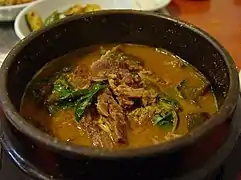 | |
| Alternative names | tan'gogiguk (North Korea), gaejangguk, gaejang, gujang, jiyangtang |
|---|---|
| Type | Guk (tang) |
| Place of origin | Korea |
| Main ingredients | Dog meat, vegetables, spices |
| South Korean name | |
| Hangul | |
|---|---|
| Hanja | |
| Revised Romanization | Bosintang |
| McCune–Reischauer | Posintang |
| IPA | [po.ɕin.tʰaŋ] |
| North Korean name | |
| Chosŏn'gŭl | |
|---|---|
| Revised Romanization | Dangogiguk |
| McCune–Reischauer | Tangogikuk |
| IPA | [tan.ɡo.ɡi.k͈uk̚] |
Bosintang[lower-alpha 1] (Korean: 보신탕; Hanja: 補身湯, South Korean name) or tan'gogiguk (단고기국, North Korean name) is a Korean soup (guk) that uses dog meat as its primary ingredient. The meat is boiled with vegetables such as green onions, perilla leaves, and dandelions, and flavorants such as doenjang, gochujang, and perilla seed powder.[1] It is seasoned with agastache rugosa before eating. The soup has been claimed to provide increased virility.[2]
The dish, as with all dog meat consumption in South Korea, has become highly controversial in recent decades. There are now a number of significant legal restrictions around the butchering of dogs. According to a 2020 survey of South Koreans, 83.8% have never eaten dog meat before.
Names
There are a number of names for the dish.
| Revised Romanization |
Hangul | Hanja | Translation |
|---|---|---|---|
| boshintang | 보신탕 | 補身湯 | "invigorating soup" |
| yeongyangtang | 영양탕 | 營養湯 | "nutritious soup" |
| boyangtang | 보양탕 | 補養湯 | "invigorating soup" |
| gaejang(guk) | 개장(국) | 개醬(국) | "dog soy bean paste soup" |
| sacheoltang | 사철탕 | 四철湯 | "soup for all seasons" |
| dangogitang | 단고기탕 | 단고기湯 | "sweet meat soup" (North Korean name) |
| gutang | 구탕 | 狗湯 | "dog soup" |
| gujang | 구장 | 狗醬 | "dog soy bean paste soup" |
| jiyangtang | 지양탕 | 地羊湯 | "land sheep soup" |
| meongmeongtang | 멍멍탕 | 멍멍湯 | "woof woof soup" |
History
Most scholars agree that people on the Korean peninsula have consumed dog meat for thousands of years. The history of bosintang is more recent. A 1849 book Dongguksesigi contains a recipe for bosintang that includes boiled dog and green onion.[3]
Boshintang is considered to be a similar dish to yukgaejang, which uses beef as its primary ingredient.
Recent status
In June 2018, a South Korean municipal court ruled that killing dogs for their meat was illegal, though this law did not make it illegal to consume dog meat.[4]
According to a 2020 survey conducted by the Humane Society International of 1,000 South Koreans, 83.8% never consumed dog meat and had no plans to ever do so. 58.6% supportted the outright ban of its consumption, with 57% of people responding that it had a negative impact on international perceptions of South Korea.[5]
On January 9, 2024, the South Korean parliament passed a law prohibiting the breeding and slaughter of dogs for consumption which will take effect in 2027 following a three-year grace period.[6]
Controversy
See also
Notes
- ↑ Also romanized boshintang.
References
- ↑ 2004 Seoul Shinmoon article
- ↑ "S Korea dog meat row deepens". BBC News. November 12, 2001. Retrieved 2009-12-31.
- ↑ "[서울신문] [씨줄날줄] 개고기/함혜리 논설위원". Archived from the original on 2016-03-03. Retrieved 2009-10-19. 2008 Seoul Shinmoon article
- ↑ ""한국 개고기 시장 1조4000억" - 프레시안". Archived from the original on 2011-10-28. Retrieved 2012-12-02.
- ↑ "식국민 84% "개고기 소비한 적 없고, 먹을 생각 없다"". Hankyoreh News. October 23, 2020.
- ↑ Yeung, Jessie; Bae, Gawon; Seo, Yoonjung; Stewart, Marc (January 9, 2024). "South Korea passes bill to ban eating dog meat, ending controversial practice as consumer habits change". CNN. Retrieved January 11, 2024.